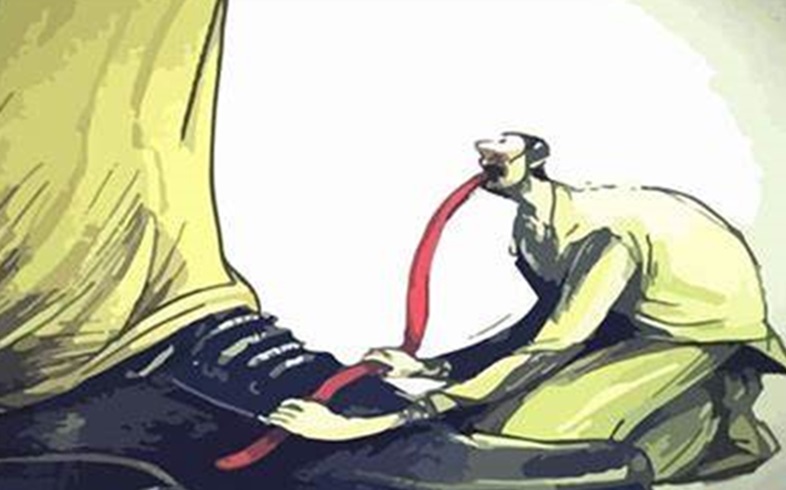Flattery and sycophancy, as harmful and destructive social phenomena, are widespread in many societies, particularly in cultures with centralized power structures and hierarchical relationships. These behaviors, which include exaggerated praise, baseless compliments, and sometimes distortion of truth to gain attention or benefits, leave profound and deep negative impacts on individuals and society.
Flattery refers to unrealistic and exaggerated praise, often carried out to achieve personal benefits, gain the approval of authorities, or establish closeness to influential figures. This behavior may be exhibited by individuals seeking immediate gains or by groups aiming to maintain their position within the power structure.
Several reasons can be cited for the proliferation of flattery and sycophancy in society. These phenomena typically thrive in societies where:
High Concentration of Power: In systems where power is concentrated in the hands of one or a few individuals, flattery becomes a tool to maintain positions or gain advantages.
Lack of Meritocracy: In the absence of systems that base decisions on merit, expertise, and capabilities, sycophants can climb to higher positions.
Fear of Criticism: In societies where there is no open space for constructive criticism, people resort to baseless compliments instead of speaking the truth.
Culture of Tolerance for Dishonesty: In cultures where dishonesty and insincere behaviors are accepted, flattery and sycophancy easily take root.
These phenomena also have numerous social consequences, which can be summarized as follows:
Undermining Meritocracy
One of the most significant consequences of the culture of flattery and sycophancy is the erosion of meritocracy. In an environment where flattery becomes the standard for evaluating individuals, genuine talents and capabilities are overlooked. This leads to inefficiency in organizations and institutions, as individuals with lesser abilities occupy higher positions.
Erosion of Public Trust
Flattery and sycophancy erode trust among people. When individuals witness that undeserved praise and sycophantic behavior result in unfair rewards, they lose faith in social systems and ethical values. This distrust can lead to reduced social cohesion and an increase in isolation and negative individualism.
Strengthening Autocracy and Corruption
Flatterers often exaggerate the abilities of leaders or those in power, paving the way for autocracy and corruption. Leaders influenced by flattery may become disconnected from reality and make decisions that disregard public interests. Over time, this can result in widespread dissatisfaction and social instability.
Weakening Ethics and Social Values
Flattery promotes insincere behaviors and dishonesty, thereby undermining ethical values. Individuals seeking personal benefits may compromise their principles, and this behavior can become a societal norm.
Suppression of Criticism and Innovation
In societies dominated by a culture of flattery, criticism and constructive viewpoints are suppressed. Out of fear of repercussions, people prefer baseless praise over truth. This stifles progress and innovation, as real problems are ignored, and opportunities for improvement are lost.
Psychological and Individual Harm
Flattery and sycophancy have negative effects not only on society but also on individuals. Over time, flatterers may experience reduced self-confidence, as they do not attribute their successes to merit. Additionally, this behavior can intensify feelings of guilt or regret.
Strategies to Counter the Culture of Flattery and Sycophancy
To reduce and counter the negative consequences of this culture, the following measures can be effective:
Promoting Transparency and Meritocracy: Establishing systems that evaluate individuals based on merit, honesty, and expertise can help curb the spread of sycophancy.
Teaching Ethics and Integrity: Institutionalizing ethical values and encouraging honest behavior from an early age can reduce flattery and sycophancy.
Creating an Open Space for Criticism: Providing an environment where individuals can freely express their opinions and criticisms without fear of consequences can significantly reduce sycophancy.
Fighting Concentrated Power: In societies where power is distributed fairly, there are fewer opportunities for flattery. Distributing power and implementing transparent oversight can limit this culture.
Appreciating Honest Behavior: Recognizing and valuing individuals for their honesty and emphasizing the importance of truth can set a positive example for society.
The culture of flattery and sycophancy threatens not only individuals but also the social and ethical foundations of society. By undermining meritocracy, reducing public trust, and strengthening autocracy, it hinders progress and sustainable development. Combating this phenomenon requires comprehensive efforts by governmental, educational, and social institutions. Only by reinforcing ethical values, promoting transparency, and creating open spaces for criticism can we prevent the destructive consequences of this culture and build a society based on justice and integrity.











Read More
The Impact of U.S. Aid Cuts to Afghanistan
Hundreds of Students Missed Educational Trips to Russia
The Damages of Widespread Migration of Afghans to Foreign Countries